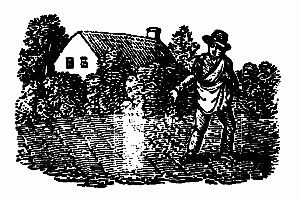Transcriber's Notes:
1. Corrections to minor spelling, punctuation, or other errors in theoriginal text appear in a detailed list at the end of this e-text.
4. Notations of inconsistencies in the original text, specifically theAppendix, Footnotes and Index, which have been retained, appear at the end of this e-text.
The Planters of Colonial Virginia
The PLANTERS OF
COLONIAL VIRGINIA
By THOMAS J. WERTENBAKER

New York
RUSSELL & RUSSELL
1959
COPYRIGHT 1922 BY PRINCETON UNIVERSITY PRESS
COPYRIGHT 1958, 1959 BY THOMAS J. WERTENBAKER
LIBRARY OF CONGRESS CATALOG CARD NUMBER 59-11228
PRINTED IN THE UNITED STATES OF AMERICA
PREFACE
America since the days of Captain John Smith has been theland of hope for multitudes in Europe. In many an humblehome, perhaps in some English village, or an Ulster farm, orin the Rhine valley, one might find a family assembled for thereading of a letter from son, or brother, or friend, who hadmade the great venture of going to the New World. "Land isabundant here and cheap," the letter would state. "Wages arehigh, food is plentiful, farmers live better than lords. If onewill work only five days a week one can live grandly."
In pamphlets intended to encourage immigration the opportunitiesfor advancement were set forth in glowing colors.In Virginia alone, it was stated, in 1649, there were "of kine,oxen, bulls, calves, twenty thousand, large and good." Whenthe traveller Welby came to America he was surprised to "seeno misery, no disgusting army of paupers, not even beggars;"while Henry B. Fearson noted that laborers were "more erectin their posture, less careworn in their countenances" thanthose of Europe.
In Virginia, as in other colonies, it was the cheapness ofland and the dearness of labor which gave the newcomer hischance to rise. The rich man might possess many thousands ofacres, but they would profit him nothing unless he could findthe labor to put them under cultivation. Indentured workersmet his needs in part, but they were expensive, hard to acquire,and served for only four years. If he hired freemen he[ii]would have to pay wages which in England would haveseemed fantastic.
Thus the so-called servants who had completed their termsand men who had come over as freemen found it easy to earnenough to buy small plantations of their own. That thousandsdid so is shown by the Rent Roll which is published as anappendix to this book. One has only to glance at it to see thatthe large plantations are vastly outnumbered by the smallfarms of the yeomen. It proves that Virginia at the beginningof the eighteenth century was not the land of huge estates,worked by servants and slaves, but of a numerous, prosperousmiddle class.
Owning plantations of from fifty to five hundred acres,cultivating their fields of tobacco, their patches of Indian cornand wheat, their vegetable gardens and orchards with theirown labor or the labor of their sons, the yeomen enjoyed asense of independence and dignity. It was their votes whichdeter